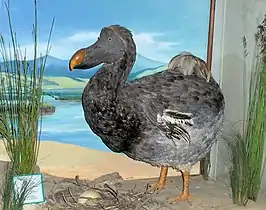| Established | 1921 |
|---|---|
| Location | East London, Eastern Cape, South Africa |
| Coordinates | 32°59′45″S 27°53′43″E / 32.9959122°S 27.895387°E |
| Type | Natural and cultural history |
| Website | www |
East London Museum is a museum in East London, Eastern Cape, South Africa, notable for holding the type specimen of the coelacanth, a fish previously believed to be long extinct. It was the workplace of Marjorie Courtenay-Latimer, the fish's discoverer.[1]
It was established in 1921 and features natural and cultural history of East London and surrounds.[2]
The museum is open week days and Saturdays. There are other galleries within the museum besides the display of the coelacanth. The museum offers displays of southern Nguni beadwork and traditional culture. The maritime gallery includes model ships and shipwreck artifacts.[3] The museum includes one living exhibit, a working bee hive.
Gallery
.jpg.webp) Display of Drury cast of the coelacanth
Display of Drury cast of the coelacanth.jpg.webp) Manta Ray
Manta Ray Dodo on display at the museum
Dodo on display at the museum
References
- ↑ Smith, J. L. B. (1956). Old Fourlegs: the Story of the Coelacanth. Longmans Green.
- ↑ "East London Museum website". East London Museum. Archived from the original on 28 March 2016. Retrieved 7 August 2016.
- ↑ "East London Museum". www.sa-venues.com. Retrieved 17 April 2018.
Wikimedia Commons has media related to East London Museum.
This article is issued from Wikipedia. The text is licensed under Creative Commons - Attribution - Sharealike. Additional terms may apply for the media files.